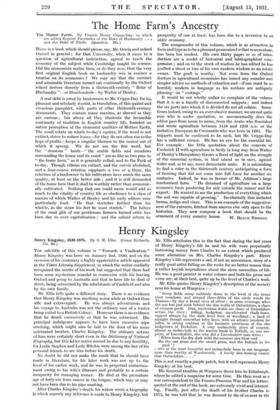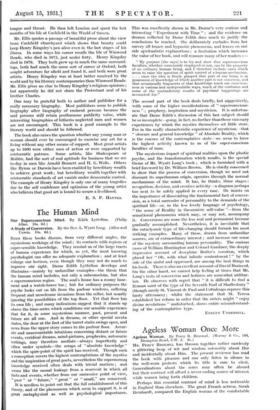Henry Kingsley
Henry Kingsley, 1830-1876. By S. M. Ellis. (Grant Richards. 12s. 6d.)
THE sub-title of this volume is "Towards a Vindication." Henry Kingsley was born on January 2nd, 1830, and on the occasion of his centenary a highly appreciative article appeared in the Times Literary Supplement, in which the writer cordially recognized the merits of his work but suggested that there had been some mysterious scandal in connexion with his leaving Oxford and going to Australia and that in later life he died of drink, being ostracized by the inhabitants of Cuckfield and also by his own family.
Mr. Ellis tells quite a different story. There is no evidence that Henry Kingsley was anything worse while at Oxford than idle and extravagant. He was always adventurous and his voyage to Australia was not the ordinary case of a waster being exiled to a British Colony. However there is no evidence that he drank excessively or that he was ostracized. His principal indulgence appears to have been excessive pipe smoking, which might also be laid to the door of his more celebrated brother, Charles Kingsley. The obituary notices of him were certainly short even in the Dictionary of National Biography, but this latter notice cannot be due to any hostility, for Leslie Stephen and Lady Ritchie were among the last of his Personal friends to see him before his death.
No doubt he did not make the mark that he should have made in literature, for his later work was not up to the level of his earlier work, and he was in perpetual embarrass- ment owing to his wife's illnesses and probably to a certain incapacity for managing money. He died at the premature age of forty-six from cancer in the tongue, which may or may not have been due to his pipe smoking.
After Charles Kingsley's death, his widow wrote a biography in which scarcely any reference is made to Henry Kingsley, but Mr. Ellis attributes this to the fact that during the last years of Henry Kingsley's life he and his wife were perpetually borrowing money from Charles to an extent which produced some alienation on Mrs. Charles Kingsley's part. Henry Kingsley's life represents a sad, if not an uncommon, story of a really good artist falling on the rocks for no better reason than a rather boyish imprudence about the stern necessities of life. He was a good painter in water colours and both his prose and verse are, at their best, quite up to the level of Charles's work.
Mr. Ellis quotes Henry Kingsley's description of the scenery near his house at Wargrave :—
" Steep fields stoop suddenly down to the level of the broad river meadows, and around three-fifths of the circle winds the Thames—by day a broad river of silver ; in some evenings, when the sun has just sunk behind the dim wolds of Oxfordshire, a chain of crimson pools. Dim, mysterious welds are those of Oxfordshire across the river ; rolling, hedgeless, uncultivated chalk down, capped always by the dark level bars of woodland ; a land of straight though somewhat lofty lines, with no artistic incident for miles, in strong contrast to the fantastic prettiness of the elm hedgerows of Berkshire. A very melancholy piece of country, almost as melancholy as the warren lands in Norfolk, or, one sus- pects, of Lincolnshire, else why did a Lincolnshire man write :
When from the dry dark wold the summer airs blow cool
On the oat grass and the sword grass, and the bulrush in the pool'?
—two of the most beautiful and melancholy lines in our language, more than worthy of Wordsworth. A lonely dim-looking county that Oxfordshire. . . ."
This is not exactly a purple patch, but it well represents Henry Kingsley at his best.
His financial troubles at Wargrave drove him to Edinburgh, where he edited a magazine for some time. He then went as a war correspondent to the Franco-Prussian War and his letters, quoted at the end of the book, are extremely vivid and interest- ing. Finally, just after the death of his brother Charles in 1875, he was told that he was doomed to die of cancer in the
tongue and throat. He then left London and spent the last months of his life at Cuckfield in the Weald of Sussex.
Mr. Ellis quotes a passage of beautiful prose about the view from Cuckfield churchyard which shows that beauty could keep Henry Kingsley's pen alive even in the last stages of his illness. In some ways his career recalls the life of Winwood Meade, who died in 1875, just under forty. Henry Kingsley died in 1876. They both grew up in much the same surround- ings, both had much the same sort of career at Oxford, both sought adventure far afield and found it, and both were great artists. Henry Kingsley was at least better received by the world and by his literary contemporaries than VVinwood Reade. Mr. Ellis gives no clue to Henry Kingsley's religious opinions ; but apparently he did not share the Protestant zeal of his brother Charles.
One may be grateful both to author and publisher for a really necessary biography. Most publishers seem to publish biography after biography of eminent persons because the said persons still retain posthumous publicity value, while interesting biographies of hitherto neglected men and women are not encouraged. This book is a good example to the literary world and should be followed.
The book also raises the question whether any young man or woman should ever be encouraged to exercise any art for a. living without any other means of support. Most great artists up to 1800 were either men of action or were supported by aristocratic patrons. Some artists, like Shakespeare or Moliere, had the sort of real aptitude for business that we see to-day in men like Arnold Bennett and H. G. Wells. Others like Byron or Darwin have been enabled by hereditary wealth to achieve great work; but hereditary wealth together with aristocratic standards of art vanish under democratic control. The example of Henry Kingsley is only one of many tragedies due to the self confidence and optimism of the young artist who believes that good art is bound to secure a livelihood.
E. S. P. HAYNES.































 Previous page
Previous page